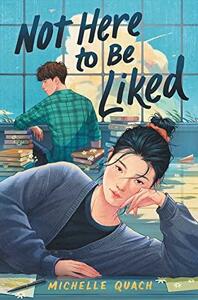You need to sign in or sign up before continuing.
Take a photo of a barcode or cover
ngl, they'll most likely break up a few years later OR get married, get divorced, then get married again
funny
lighthearted
mysterious
fast-paced
Plot or Character Driven:
Character
Strong character development:
No
Loveable characters:
Yes
Diverse cast of characters:
Yes
Flaws of characters a main focus:
Yes
lighthearted
reflective
medium-paced
Plot or Character Driven:
A mix
Strong character development:
Yes
Loveable characters:
Yes
Diverse cast of characters:
Yes
Flaws of characters a main focus:
Yes
Oh to be a young woman of color in this world
Graphic: Sexism
Moderate: Bullying
This book made me feel very single in a hundred different ways. But it was also a beautiful recollection of girlhood, of trying to overcome the misogyny in your own self and learn to look past it to meet all these wonderful people.
Both Eliza and Len were complicated characters that fucked up, got twisted in their lies and secrets, but when push came to shove they worked through it. The background characters were wonderful and Eliza's mother made me love her, hate her, then love her again, like I was her daughter and going through the journey of loving-hating-loving your mother. I loved and pitied her father but then thought "why pity a man who put his family at jeopardy for his own pleasure?" and then "why hate him for what almost all fathers do?"
In short, it was a refreshing read about realistic humans and excellent book recommendations. I loved it!!!!!!
Both Eliza and Len were complicated characters that fucked up, got twisted in their lies and secrets, but when push came to shove they worked through it. The background characters were wonderful and Eliza's mother made me love her, hate her, then love her again, like I was her daughter and going through the journey of loving-hating-loving your mother. I loved and pitied her father but then thought "why pity a man who put his family at jeopardy for his own pleasure?" and then "why hate him for what almost all fathers do?"
In short, it was a refreshing read about realistic humans and excellent book recommendations. I loved it!!!!!!
3.5* - author did a great job with all the characters except Len. every character is so flawed and real and absolutely stupid except Len, who doesn't seem to have much of a personality beyond his confession about baseball. what is his stance on Eliza's movement, how is he affected by all the calls for him to resign, there are so many unanswered questions about him. I also wish there was more of a feminism-related buildup to the main conflict (such as various instances of men being elected more easily than women) instead of Eliza's first instinct being to blame feminism, because in all honesty, before I kept reading, I felt she was being a bit of a sore loser, and I wish there was less of an incentive to victim-blame. I know at its core it's calling people like me out, but I felt it could've been done a little differently
it's past midnight as I write this, and I've just binged 4 cheesy books with an Asian girl lead and an Asian romance in the last 24 hours. So I’m clearly in the right state of mind to write this review right now
funny
inspiring
reflective
medium-paced
Plot or Character Driven:
A mix
Strong character development:
Yes
Loveable characters:
Yes
Diverse cast of characters:
Yes
Flaws of characters a main focus:
Yes
funny
informative
inspiring
lighthearted
relaxing
fast-paced
Plot or Character Driven:
Character
Strong character development:
Yes
Loveable characters:
Yes
Diverse cast of characters:
N/A
Flaws of characters a main focus:
Yes
This is long. I am so sorry. . .
Before I begin, I just want to state that I know the target audience for young adult books is usually teenagers, and I am in no way a teenager anymore, but reading this and thinking of young teenagers also experiencing this book, really disappointed me.
I went into this solely for the representation. The main character and author are both of Chinese Vietnamese American descent. And then there’s the enemies to frenemies to friends to lovers trope. Chef’s kiss. 🤌 The feminism rep. . . not so much.
The views on feminism in <i>[book:Not Here to Be Liked|56755542]</i> are something that I would expect in a young adult novel from the early 2000’s. Hell, even from within the last ten years I would have expected this. But we live in the world 2023 (this being published in 2021—so we’ll round down to the cursed year of 2020) and we should not be doing this.
<i>Not Here To Be Liked</i> gives feminism the definition of “ONLY women being in power” and “down to all men”.
This movement is started when ex-jock Len DiMartile decides to run against our heroine, Eliza Quan, as editor in chief for the school newspaper. ((First off, I just want to say that I did not even know that campaigning for “editor in chief” was a thing. I am from a small town, though, where such titles were given to the most qualified senior by the teacher in charge so 🤷. I admit that I have no knowledge on the matter. If they were running for student body counselor or whatever, the campaign would have made more sense to me.)) When Len wins the election, Eliza is steamed and writes a rant report (on the school computer, mind you) venting out her feelings and frustrations against Len and her fellow members of the newspaper.
And then, surprise—because she was writing on a school computer and didn’t close out of the document before leaving—her rant gets published into the next morning’s issue of the paper, titled <b>“THE PATRIARCHY LIVES”</b>. Rookie mistake, but I feel like if you’re going to be writing a rant against your fellow classmates, then don’t do it on school grounds, on a school computer, let alone a <b>DESKTOP</b> computer that you can’t physically take with you.
As a result of the article in the school paper, her classmates turn against her. Going as far as calling her a “Femnazi” to stuffing tampons in her locker, Eliza is caught between being in charge of a feminist movement and being called the girl who cried misogyny.
Are we seriously still using the term “Femnazi” to describe angry women?
Unfortunately, the movement was very much just Eliza throwing a temper tantrum because she didn’t get the position that she wanted. In reality, Len is voted for the part because he gave a better speech and impression than Eliza did—which is very close to how the real world works. If you show up for a job interview with all of the qualifications but dress like you just rolled out of bed and half-ass your interview, then guess what—you’re not getting hired at that job.
But anyway, Eliza loses the election and goes on another rant after her essay is published without her permission. She goes live on the school news (like TV news) and once again lets out her frustrations against her classmates being against her, calls out her school for being sexist for not having a female leader, slanders Len <i>again</i>, and dumps the pile of tampons on the news table at the end of her interview.
Instead of being a good sport and accepting the fact that she lost fairly because she <b>wasn’t qualified for the job</b>, she turns into the villain of the story.
Obviously the principal doesn’t like that so he calls her to his office. But no, nothing that her principal says to her inspires the movement. (Which it honestly should have because “tampons not being appropriate for the school video” would have been enough for me.) There was so much potential between the name calling, the tampons, even just the fact that there hadn’t been a girl (or not that many girls (I honestly don’t remember) in charge of their school’s clubs, would have made a better movement than what actually happened. But no, we have all of this great potential, and Eliza and her team want to form a walk-out of their school because of Len. Because everyone liked his speech better and Eliza thought that she deserved that position over him. Because it’s obviously his fault and not the principal or the school’s.
Eliza’s whole personality was the equivalent of a pick-me girl that claimed she “wasn’t like other girls”. Multiple times she comments on how her sister or other girls are always doing their hair and makeup and dressing up, but she doesn’t. Like, I don’t care. So what. Do you want a cookie or something? She even goes as far as calling herself a fake and not really a feminist because she starts having feelings for Len. Liking a boy doesn’t make you any less of a feminist. What? Just because he won over you in a competition makes you think that you can’t like him or something? And then she even battles with herself for wanting to be known for her brains and not her beauty. Why not both? Can pretty women not be smart too? Can smart women not be pretty?
It took me YEARS before I finally understood what the meaning of feminism actually was. I remember, as a teenager and young adult, thinking that it meant a bunch of angry women burning their bras and wanting men to step down from their jobs so that they could take over. It saddens me that we still have media like this in today’s world. And that the possibility of teenagers and young adults reading this book could be confused or question their own views on feminism. Granted, towards the very end of the book, Eliza does question and reevaluate her views on feminism, but this kind of representation is the last thing we need.
Feminism isn’t about women being in power, or hating men. It never has been and anyone that tells you otherwise is not a feminist.
━━━━━━━━━━☽✰☾━━━━━━━━━━
Before I begin, I just want to state that I know the target audience for young adult books is usually teenagers, and I am in no way a teenager anymore, but reading this and thinking of young teenagers also experiencing this book, really disappointed me.
I went into this solely for the representation. The main character and author are both of Chinese Vietnamese American descent. And then there’s the enemies to frenemies to friends to lovers trope. Chef’s kiss. 🤌 The feminism rep. . . not so much.
The views on feminism in <i>[book:Not Here to Be Liked|56755542]</i> are something that I would expect in a young adult novel from the early 2000’s. Hell, even from within the last ten years I would have expected this. But we live in the world 2023 (this being published in 2021—so we’ll round down to the cursed year of 2020) and we should not be doing this.
<i>Not Here To Be Liked</i> gives feminism the definition of “ONLY women being in power” and “down to all men”.
This movement is started when ex-jock Len DiMartile decides to run against our heroine, Eliza Quan, as editor in chief for the school newspaper. ((First off, I just want to say that I did not even know that campaigning for “editor in chief” was a thing. I am from a small town, though, where such titles were given to the most qualified senior by the teacher in charge so 🤷. I admit that I have no knowledge on the matter. If they were running for student body counselor or whatever, the campaign would have made more sense to me.)) When Len wins the election, Eliza is steamed and writes a rant report (on the school computer, mind you) venting out her feelings and frustrations against Len and her fellow members of the newspaper.
And then, surprise—because she was writing on a school computer and didn’t close out of the document before leaving—her rant gets published into the next morning’s issue of the paper, titled <b>“THE PATRIARCHY LIVES”</b>. Rookie mistake, but I feel like if you’re going to be writing a rant against your fellow classmates, then don’t do it on school grounds, on a school computer, let alone a <b>DESKTOP</b> computer that you can’t physically take with you.
As a result of the article in the school paper, her classmates turn against her. Going as far as calling her a “Femnazi” to stuffing tampons in her locker, Eliza is caught between being in charge of a feminist movement and being called the girl who cried misogyny.
Are we seriously still using the term “Femnazi” to describe angry women?
Unfortunately, the movement was very much just Eliza throwing a temper tantrum because she didn’t get the position that she wanted. In reality, Len is voted for the part because he gave a better speech and impression than Eliza did—which is very close to how the real world works. If you show up for a job interview with all of the qualifications but dress like you just rolled out of bed and half-ass your interview, then guess what—you’re not getting hired at that job.
But anyway, Eliza loses the election and goes on another rant after her essay is published without her permission. She goes live on the school news (like TV news) and once again lets out her frustrations against her classmates being against her, calls out her school for being sexist for not having a female leader, slanders Len <i>again</i>, and dumps the pile of tampons on the news table at the end of her interview.
Instead of being a good sport and accepting the fact that she lost fairly because she <b>wasn’t qualified for the job</b>, she turns into the villain of the story.
Obviously the principal doesn’t like that so he calls her to his office. But no, nothing that her principal says to her inspires the movement. (Which it honestly should have because “tampons not being appropriate for the school video” would have been enough for me.) There was so much potential between the name calling, the tampons, even just the fact that there hadn’t been a girl (or not that many girls (I honestly don’t remember) in charge of their school’s clubs, would have made a better movement than what actually happened. But no, we have all of this great potential, and Eliza and her team want to form a walk-out of their school because of Len. Because everyone liked his speech better and Eliza thought that she deserved that position over him. Because it’s obviously his fault and not the principal or the school’s.
Eliza’s whole personality was the equivalent of a pick-me girl that claimed she “wasn’t like other girls”. Multiple times she comments on how her sister or other girls are always doing their hair and makeup and dressing up, but she doesn’t. Like, I don’t care. So what. Do you want a cookie or something? She even goes as far as calling herself a fake and not really a feminist because she starts having feelings for Len. Liking a boy doesn’t make you any less of a feminist. What? Just because he won over you in a competition makes you think that you can’t like him or something? And then she even battles with herself for wanting to be known for her brains and not her beauty. Why not both? Can pretty women not be smart too? Can smart women not be pretty?
It took me YEARS before I finally understood what the meaning of feminism actually was. I remember, as a teenager and young adult, thinking that it meant a bunch of angry women burning their bras and wanting men to step down from their jobs so that they could take over. It saddens me that we still have media like this in today’s world. And that the possibility of teenagers and young adults reading this book could be confused or question their own views on feminism. Granted, towards the very end of the book, Eliza does question and reevaluate her views on feminism, but this kind of representation is the last thing we need.
Feminism isn’t about women being in power, or hating men. It never has been and anyone that tells you otherwise is not a feminist.
━━━━━━━━━━☽✰☾━━━━━━━━━━






